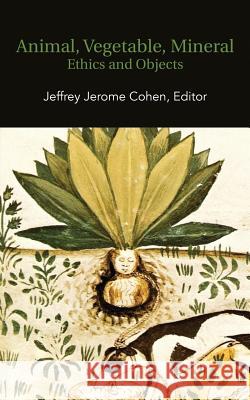Animal, Vegetable, Mineral: Ethics and Objects » książka
Animal, Vegetable, Mineral: Ethics and Objects
ISBN-13: 9780615625355 / Angielski / Miękka / 2012 / 310 str.
"Animal, Mineral, Vegetable: Ethics and Objects" examines what happens when we cease to assume that only humans exert agency. Through a careful examination of medieval, early modern and contemporary lifeworlds, these essays collectively argue against ecological anthropocentricity. Sheep, wolves, camels, flowers, chairs, magnets, landscapes, refuse and gems are more than mere objects. They act; they withdraw; they make demands; they connect within lively networks that might foster a new humanism, or that might proceed with indifference towards human affairs. Through what ethics do we respond to these activities and forces? To what futures do these creatures and objects invite us, especially when they appear within the texts and cultures of the "distant" past? TABLE OF CONTENTS: Jeffrey J. Cohen: "Introduction: All Things" - Karl Steel: "With the World, or Bound to Face the Sky: The Postures of the Wolf-Child of Hesse" - Sharon Kinoshita: "Animals and the Medieval Culture of Empire" - Kellie Robertson: "Exemplary Rocks" - Valerie Allen: "Mineral Virtue" - Peggy McCracken (University of Michigan): "The Human and the Floral" - Eileen Joy: "You Are Here: A Manifesto" - Julian Yates: "Sheep Tracks: A Multi-Species Impression" - Julia Reinhard Lupton: "The Renaissance Res Publica of Things" - Jane Bennett: "Powers of the Hoard: Notes on Material Agency" Response Essays: Lowell Duckert, "Speaking Stones, John Muir, and A Slower (Non)humanities" - Nedda Mehdizadeh, "Ruinous Monument: Transporting Objects in Herbert's Persepolis" - Jonathan Gil Harris, "Animal, Vegetable, Mineral: Twenty Questions"











